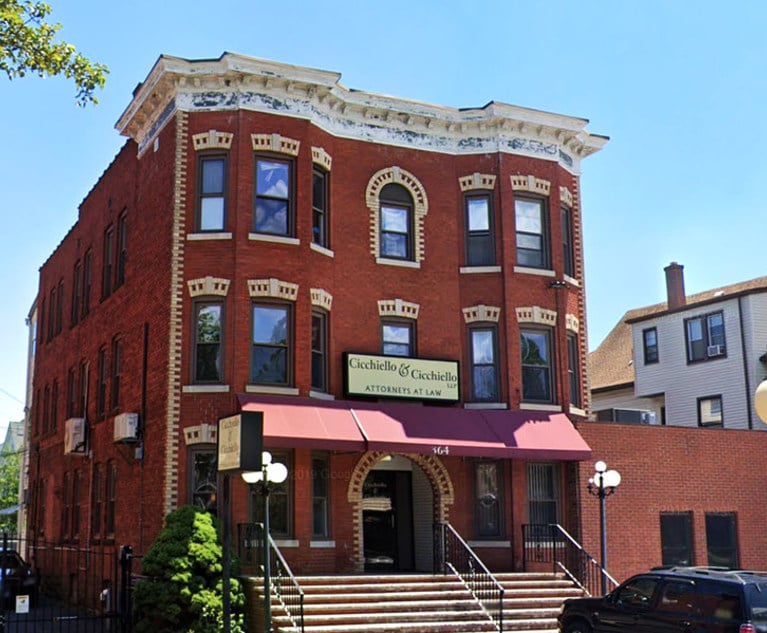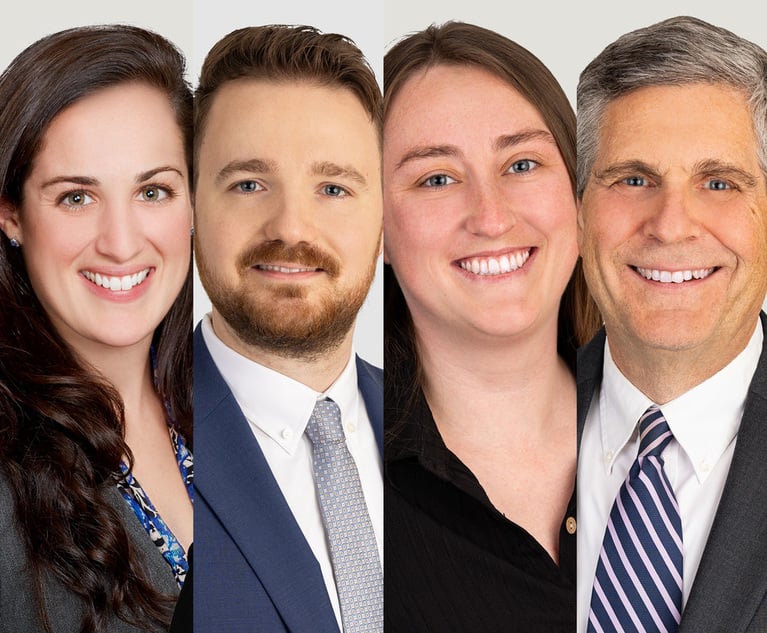Connecticut Attorney Tests Waters of Racial Discrimination in Marijuana Laws
Attorneys for William Bradley will test the alleged racial discriminatory laws related to marijuana possession. Bradley was arrested on possession, but uses cannabis for cancer treatment.
November 03, 2017 at 04:03 PM
4 minute read

Claiming the state's marijuana laws are discriminatory against African-Americans, a prominent marijuana advocate is hoping the Connecticut courts will take action.
Attorney Aaron Romano, who serves as legal counsel for the Connecticut chapter of the National Organization for the Reform of Marijuana Laws (NORML), is set to make oral arguments Nov. 15 at Middletown Superior Court, representing a defendant charged with possession.

Romano said Friday it does not matter to the policy argument that his client, William Bradley, is white. Romano said he is trying to rid the state of its punitive marijuana laws, which he said are racially discriminatory.
“Once the statute is passed with a racial discriminatory purpose, it does not matter who is challenging it,” Romano said. “The fact that my client is white makes no difference.”
Unable to post a $150,000 bond, the 49-year-old Bradley has been in jail on a violation of probation charge after being arrested for possession of 1.75 pounds of marijuana. While Romano said Bradley, a cancer patient from Clinton, was using the drug for medicinal purposes, the state disagreed. Bradley had been on probation for being caught previously with 8.5 pounds of marijuana.
Romano calls the current case a landmark because this is the first time the courts will look at whether the state's marijuana laws discriminate based on race.
To back up his argument, Romano will have statistician Jon Gettman speak Nov. 15 before Superior Court Judge Maureen Keegan. Gettman is a professor at Shenandoah University in Virginia, and has a master's degree from American University in criminal justice specializing in drug policy.
Gettman originally performed a study for NORML of Connecticut's arrest rates by race for marijuana possession.
“We have data dating back to 1994 that shows African-Americans are four times more likely to be arrested for marijuana sale and possession than their white counterparts,” said Romano, a solo practitioner from Bloomfield.
Specifically, Romano said, Gettman analyzed the FBI's own database on offense, demographics and race.
In 2015 in Connecticut, Romano said, arrest rates for every 100,000 whites were 57.01, while it was 213.78 for every 100,000 African-Americans. In Connecticut, whites are about 80 percent of the population compared to 11.1 percent for blacks. In actual numbers in 2015, Romano said, more whites were arrested only because they are 80 percent of the population. In raw numbers, Romano said, 1,655 whites and 894 African-Americans were arrested for possession and sale of marijuana in the state in 2015.
Romano said marijuana laws throughout the country—including in Connecticut—”were passed around the same time as the Jim Crow laws were enacted. Its original intent was to disenfranchise minority people from being able to vote.”
Marijuana laws on the books today stem from “institutionalized racism,” Romano said. “We accept it, and that is the way we do it. It's the status quo. We are not critically analyzing our laws and our motivations for passing these laws. There is discriminatory intent.”
Romano said he's optimistic about victory, saying: “There are moments when the courts step in and says what the legislature has done is unconstitutional. Sometimes upholding the law means striking down a law.”
Longtime New Haven attorney Hugh Keefe said whether or not Romano wins will be based on his scientific evidence.
“If he has the science to back him up he is in good shape, otherwise it's a dead issue,” said Keefe, a partner with Lynch, Traub, Keefe & Errante.
John Thomas, professor of law at Quinnipiac University, has a different take on the issue.
“I think he's conflating two issues,” Thomas said Friday. “One is the law itself, and the second is enforcement. The law on its face is not discriminatory. It applies to everyone in the state equally,”
Thomas said, though, “it's important to point out that the enforcement of many laws, especially drug laws across the United States, burdens minority communities more so than white communities. For evidence of this, just look at the incarceration rates of minorities before and after the war on drugs.”
Russell Zentner, senior assistant state's attorney, is representing Connecticut in the Bradley case. Zentner was not available to respond to a request for comment.
This content has been archived. It is available through our partners, LexisNexis® and Bloomberg Law.
To view this content, please continue to their sites.
Not a Lexis Subscriber?
Subscribe Now
Not a Bloomberg Law Subscriber?
Subscribe Now
NOT FOR REPRINT
© 2024 ALM Global, LLC, All Rights Reserved. Request academic re-use from www.copyright.com. All other uses, submit a request to [email protected]. For more information visit Asset & Logo Licensing.
You Might Like
View All
Managing Partner Vindicated in Disciplinary Proceeding Brought by Former Associate
5 minute read
Connecticut Movers: Year-End Promotions, Hires and an Office Opening
5 minute read
GC Pleads Guilty to Embezzling $7.4 Million From 3 Banks

Trending Stories
- 1Insurer Not Required to Cover $29M Wrongful Death Judgment, Appeals Court Rules
- 2Slideshow: Jewish Bar Association of Georgia Marks 1st Year With Hanukkah Party
- 3Holland & Knight Launches Export Control Disputes and Advocacy Team
- 4Blake Lively's claims that movie co-star launched smear campaign gets support in publicist's suit
- 5Middle District of Pennsylvania's U.S. Attorney Announces Resignation
Who Got The Work
Michael G. Bongiorno, Andrew Scott Dulberg and Elizabeth E. Driscoll from Wilmer Cutler Pickering Hale and Dorr have stepped in to represent Symbotic Inc., an A.I.-enabled technology platform that focuses on increasing supply chain efficiency, and other defendants in a pending shareholder derivative lawsuit. The case, filed Oct. 2 in Massachusetts District Court by the Brown Law Firm on behalf of Stephen Austen, accuses certain officers and directors of misleading investors in regard to Symbotic's potential for margin growth by failing to disclose that the company was not equipped to timely deploy its systems or manage expenses through project delays. The case, assigned to U.S. District Judge Nathaniel M. Gorton, is 1:24-cv-12522, Austen v. Cohen et al.
Who Got The Work
Edmund Polubinski and Marie Killmond of Davis Polk & Wardwell have entered appearances for data platform software development company MongoDB and other defendants in a pending shareholder derivative lawsuit. The action, filed Oct. 7 in New York Southern District Court by the Brown Law Firm, accuses the company's directors and/or officers of falsely expressing confidence in the company’s restructuring of its sales incentive plan and downplaying the severity of decreases in its upfront commitments. The case is 1:24-cv-07594, Roy v. Ittycheria et al.
Who Got The Work
Amy O. Bruchs and Kurt F. Ellison of Michael Best & Friedrich have entered appearances for Epic Systems Corp. in a pending employment discrimination lawsuit. The suit was filed Sept. 7 in Wisconsin Western District Court by Levine Eisberner LLC and Siri & Glimstad on behalf of a project manager who claims that he was wrongfully terminated after applying for a religious exemption to the defendant's COVID-19 vaccine mandate. The case, assigned to U.S. Magistrate Judge Anita Marie Boor, is 3:24-cv-00630, Secker, Nathan v. Epic Systems Corporation.
Who Got The Work
David X. Sullivan, Thomas J. Finn and Gregory A. Hall from McCarter & English have entered appearances for Sunrun Installation Services in a pending civil rights lawsuit. The complaint was filed Sept. 4 in Connecticut District Court by attorney Robert M. Berke on behalf of former employee George Edward Steins, who was arrested and charged with employing an unregistered home improvement salesperson. The complaint alleges that had Sunrun informed the Connecticut Department of Consumer Protection that the plaintiff's employment had ended in 2017 and that he no longer held Sunrun's home improvement contractor license, he would not have been hit with charges, which were dismissed in May 2024. The case, assigned to U.S. District Judge Jeffrey A. Meyer, is 3:24-cv-01423, Steins v. Sunrun, Inc. et al.
Who Got The Work
Greenberg Traurig shareholder Joshua L. Raskin has entered an appearance for boohoo.com UK Ltd. in a pending patent infringement lawsuit. The suit, filed Sept. 3 in Texas Eastern District Court by Rozier Hardt McDonough on behalf of Alto Dynamics, asserts five patents related to an online shopping platform. The case, assigned to U.S. District Judge Rodney Gilstrap, is 2:24-cv-00719, Alto Dynamics, LLC v. boohoo.com UK Limited.
Featured Firms
Law Offices of Gary Martin Hays & Associates, P.C.
(470) 294-1674
Law Offices of Mark E. Salomone
(857) 444-6468
Smith & Hassler
(713) 739-1250










